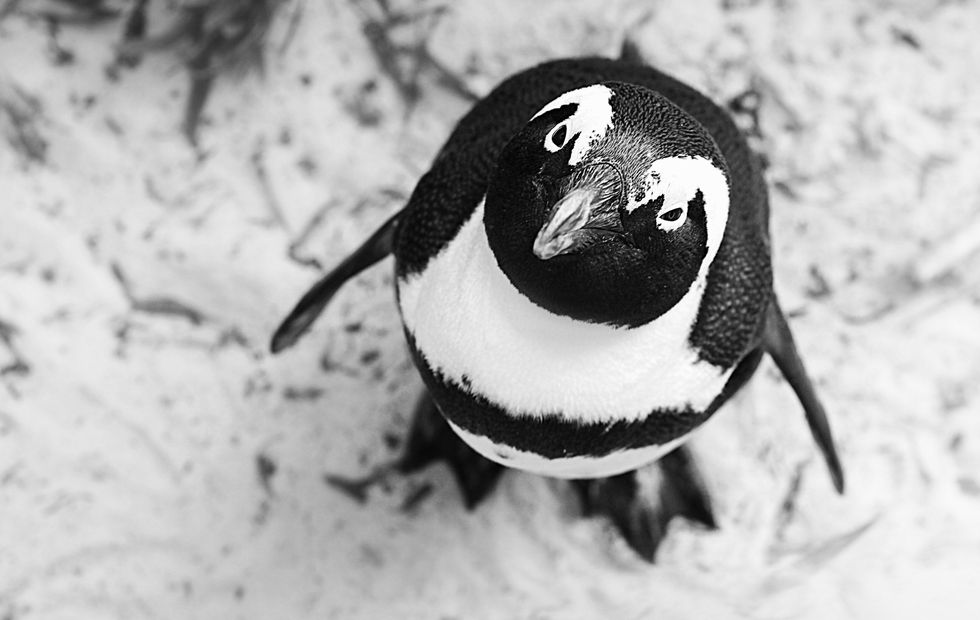While I was browsing the internet the other day, I stumbled upon some news. A study just out from the Italian University of Turin, the internet claims, provides evidence to suggest that penguins use language in the same way that humans do. Do they actually? When I saw how many outlets had picked up the story, it reminded me of all that hoopla surrounding dolphin calls and gorilla ASL from a few years ago. In this piece I'll break down exactly what's going on here so you can sound smart (but also BE smart)!

The short, slightly disappointing answer? No. But the longer, scientific, super-interesting answer? Kind of.
So what's the big deal? I'll tell you: the capacity for language is one of the things that separates humanity as a species from animals. And if there is compelling evidence that animals use language the same way that humans use language, those starkly-defined boundaries start to blur. So, we have to pay attention to these studies, because the way we think about life on Earth depends on it.
Here's a little background on what "language" means. This definition is different across disciplines, but for the purposes of this article, I'll keep it basic. Language is an arbitrary, rule-governed, mutually-agreed-upon written, gestural, and/or spoken system of communication.
Oof.
Let's break that down:
- Arbitrary: most of the words we have have no actual link to the thing we are talking about (AKA a referent). So the word "ball" doesn't really convey anything about an actual ball except for the fact that we all agree that it's the word to use.
- Rule-governed: A language has to have rules for people to be able to understand each other. In English, we typically use the sentence order noun phrase + verb phrase. "Tom slept" or "My sister Ann was thinking that, too" follow this subject stuff-then-verb stuff. These rules cover all areas of language: the way we spell, how we use verb tenses, when we decide to make a word "your" or "you're." All world languages are rule-governed, but I used English examples here.
-Mutually-agreed-upon: All of the speakers of a language, either implicitly or explicitly, agree to use the rules they are taught. If I decide that adding "s" to the end of a noun means singular, but another person chooses it to mean plural, we won't be able to communicate.
Most importantly, we have to distinguish language from communication. Animals communicate all the time: wolves howl, whales sing, crickets chirp. But these acts are merely communication because of the message they send. Animals talk about the "here-and-now." Animals cannot really comprehend something in the past or future, nor something that they cannot immediately see. This essential property is called displacement.

So, in essence, communication is "Look at this thing I have!" Or "Stop following me because I'll bite you!" while language includes messages like "Gosh, I wonder what that person ate for breakfast yesterday, or "What do you want to be when you grow up?"
All that to say--this penguin stuff is a little more complicated than it looks. So, what did that study find, really? It found evidence to suggest that penguins conform to Zipf's Law and the Menzerath-Altmann Law. These findings imply that not only primates share some aspects of communication with humans. Zipf's Law, AKA Zipf's Law of Brevity, states that across languages, the words that we use more often tend to be shorter. Makes sense- we say "Mom" all the time but "philosopher" not so much. And words that we have to start saying all the time, we make shorter: think "phone" for "telephone." The Menzerath-Altmann Law, AKA Menzerath's Law, states that longer words or longer sentences are made up of smaller phrases or syllables.
Apparently, penguin "songs" follow both of these laws: first, the calls that are most frequent tend to be the shortest, and second, the calls that are more intricate are made up of pieces that are more simple.
So, wow! Scientists figured that out! And even if penguins can't start having conversations with us, I still think they're cute.

- Penguins Speak Like People, According to New Research ›
- Penguins may have the same vocal patterns as HUMANS | Daily ... ›
- Penguins Speak Like People, According to New Research | | kctv5 ... ›
- Penguins use small talk to speak to each other like humans do ... ›
- Penguins Speak Like People, According to New Research ›
- African penguins 'talk' with similar linguistic patterns as humans ›
- Penguins Speak Like People, According to New Research | Travel + ... ›
- Jackass penguins talk like people | Popular Science ›
- Penguins speak like humans, scientists discover - CBBC Newsround ›
- Penguins speak to each other just like humans do | Euronews ›


















